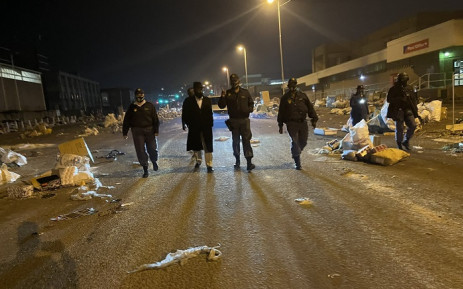Police Minister Bheki Cele accompanies SAPS officials in Durban as they apprehend looters at warehouses near the N2. [Picture: Lirandzu Themba]
DURBAN – Amid last week’s unrest in the country, racial tension is said to have increased in the KwaZulu-Natal region after footage of alleged racism circulated on social media.
During Salaamedia’s annual Hajj broadcast, the Prophet Muhammad’s (PBUH) powerful message on racism, the sanctity of life and the protection of property was highlighted.
An expert panel consisting of Moulana Vuyo Mokoena, Imam of Bekersdal Masjid, Dr Quraysha Sooliman, University of Pretoria, Dr. Faisal Suliman, chairperson of South African Muslim Network (SAMNET) and Zenokuhle Imaan Xaba, co-founder of Muslimah’s On Call was hosted by Inayet Wadee on the day of Arafat, to discuss the racial tension in KZN in relation to the teachings of Islam.
Dr. Faisal Suliman pointed out that the mission of the Prophet (PBUH) was that of social justice and to establish equality upon people. He said: “The Quraan is quite clear: the question is about the implementation by saying ‘how do we implement it?’ and ‘how do we get over the legacies of Apartheid, tribalism and our caste systems?’”
He added that “we have to start identifying and analysing issues and start addressing them.”
Dr. Quraysha Sooliman, an academic at the University of Pretoria noted that “there is tremendous shortfall in terms of updating ourselves [educationally] out of the colonial mind-set.”
Racism has been an ongoing issue across the world and, according to Zenzokuhle Xaba, it exists within the Muslim community despite Islam teachings disallowing it.
Xaba said:“We seem to forget that piousness will be judged [by our Creator], not race.”
Commenting on the ongoing struggle of racism, Ml. Mokoena said: “[the government] does not sort out issues. We will have a commission here and there [but] nothing comes out of it. We have been discussing race without a conclusion and, whenever there is a problem, that is when we now want to come up with a solution. So, it is this attitude of procrastination and superiority that breeds racism.”
Ml. Mokoena concurred with Dr. Faisal Suliman, saying that there are ideas which are not being implemented to get rid of racism in the country.
As issues are being identified in the communities which we operate in, Dr. Quraysha Sooliman said: “Apartheid put us in different categories and then we started looking down on one another and we have to realise the severe discrimination in our communities.”
She proposes that communities address the topic of racism and equality at home first, with our families, so that it can be implemented outside. Zenzokuhle agrees, saying: “As a black Muslim woman, I know the struggle [of racism].”
“Before we cry to the government to implement [action against] racism and poverty, we need to sort it out within ourselves,” said Ml. Mokoena.
He continued by condemning racism and looting. He said: “Racism and looting are equally bad and when I am condemning racism is does not mean I am promoting looting. You cannot be racist for condemning looting or protecting your property that is being looted.”
Dr. Quraysha Sooliman goes on to further say that a lack of communication within the Muslim community is the reason why there are issues and misunderstandings.
Zenzokuhle suggested when Zakat is given to organisations and communities there should be better community engagement. This, she said, will help identify the needs of the area instead of assuming what is needed.
Giving final remarks on the topic, Zenzokuhle Xaba said that Muslims need to go back and learn about the history of Islam and need to move away from the superiority complex that currently exists amongst many.
“I think the black muslim community needs to sort of cut that the umbilical cord from the Indian Muslim community so that there is growth from within as this will help resolve some issues,” Dr. Faisal Suliman said.
Dr. Quraysha Sooliman ends off the panel discussion by saying that we need not only respect each other but also cut the umbilical cord of generational ideologies.
Watch the full discussion here:
